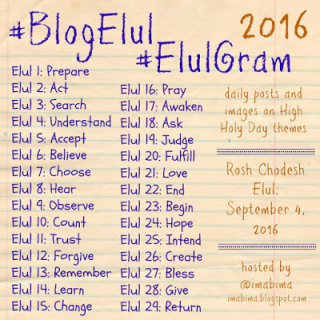Rachel Barenblat's Blog, page 98
October 3, 2016
The beginning of change: a sermon for Rosh Hashanah morning
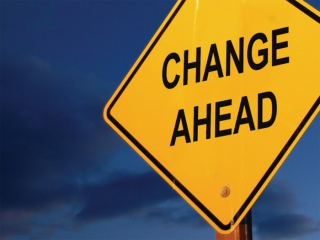 Rosh Hashanah is often translated as "head of the year." That translation isn't incorrect. Of course rosh means head, and shanah means year. The headwaters of a river are where the river begins, and the head of the year is where the year begins. But Hebrew is a deep language. Words that share roots are variations on a theme. And because of that, "Rosh Hashanah" also has a deeper meaning.
Rosh Hashanah is often translated as "head of the year." That translation isn't incorrect. Of course rosh means head, and shanah means year. The headwaters of a river are where the river begins, and the head of the year is where the year begins. But Hebrew is a deep language. Words that share roots are variations on a theme. And because of that, "Rosh Hashanah" also has a deeper meaning.
My friend and teacher Rabbi Marcia Prager, the dean of the ALEPH Ordination Program, wrote a book called The Path of Blessing. (That book is in our congregational library.) In The Path of Blessing, she dedicates a whole chapter to each of six Hebrew words: ברוך אתה ה׳ אלוהינו מלך העולם / Baruch atah Adonai, eloheinu melech ha'olam.
How could one possibly have that much to say about each of those little words? Because of how Hebrew works, each word is a linguistic hyperlink to a cluster of other words in ways that radically deepen our sense of what a word means. Here's a tiny taste. How would you translate baruch?
Maybe you're thinking "blessed." As in, "Blessed are You, Adonai our God..." But baruch also relates to berech, knee. That means baruch can suggest a posture of willingness to be humble before the person to whom I am speaking. Baruch also relates to breicha, a flowing fountain. So baruch can suggest both the cosmic flow of abundance, and the flow of spiritual life. This is why Reb Marcia often translates "Baruch atah" as "A Fountain of Blessings are You..."
Just as baruch holds hints of berech and breicha, hints of bending the knee in grateful humility and drinking from the fountain of divine abundance, shanah holds hints of another word in its word-root family tree: shinui, which means change.
Rosh Hashanah is the beginning of change.
I've known this linguistic teaching for years. But it speaks to me in a new way this year, my first Rosh Hashanah as someone whose marriage has ended. That's a pretty profound change.
Here are some things I have learned about change since the last time I stood before y'all to offer a high holiday sermon.
Change can feel good. Have you ever had the experience of going into a department store and being fitted for something, and even though you thought you knew what size you needed, the expert salesperson recognized that you would be better off in a different size? In cases like those, change can be a relief.
But more often, change is hard. Change is uncomfortable. Even if it turns out you need a narrower shoe than you thought, your feet are probably accustomed to the way your old sneakers fit, and new shoes can rub blisters.
Change takes some getting-used-to. Every kid in this room just started a new grade, and even if you're at the same school you attended last year, there are new rhythms and new expectations. Bumping up against those can be awkward and disconcerting.
Change involves risk. You buy a new car and then discover you don't like how the back-up camera works, or you can't get the seat adjusted exactly the way you want it, or it isn't quite what you imagined. Or you leave a job and then discover you don't like the new one, or retirement doesn't agree with you the way you expected.
Change goes hand-in-hand with loss. Maybe you liked the way things were, and then they changed. You liked kindergarten, and now first grade is overwhelming. You liked your old haircut, and now the new one feels strange. You liked the way a friendship used to function, and now it isn't supporting you the way it used to. Or: maybe you didn't like the way things were, but now that they've changed, you miss what used to be. It wasn't perfect, but it was familiar, and now that familiarity is gone.
Change is inevitable. Authentic spiritual life requires us to be open to change. Because change is always happening, whether we want it to or not.
I adore my son, who's going on seven. There are times when I wish I could live an eternity with this version of my kid, who is sweet and funny and thoughtful and surprising. He won't always want to cuddle with me before bed and sing the shema and the angel song. He won't always look up to me the way he does now. But the only way to freeze a life in time is, God forbid, to end it. As long as we live, we're changing.
Our relationships change. Sometimes that's truly dramatic -- two people decide to marry, or to end a marriage. Sometimes it's subtle -- a friendship slowly disintegrates, or slowly deepens and becomes something rich and new.
Our emotional lives change. We move through periods of grief and periods of joy. When life feels sweet, it's natural to want to hold on to that sweetness. And when life feels bitter, it's natural to yearn for a life that's "better than this." That may be especially true when the bitterness afflicts someone whom we love, because watching a loved one suffer can be harder than suffering ourselves. When life hurts, the promise of change can bring hope. When life is sweet, the promise of change can feel threatening. But either way, the fact of change isn't optional.
Some changes are one's own decision. Maybe you've chosen in the last year to begin a relationship, or to end one. To try to get pregnant, or to stop trying. To begin a new job, or to leave the job you had. But even when we choose change, we don't get to choose how that change feels, or whether it's difficult sometimes. (Pro tip: there is no change that isn't difficult sometimes.)
Other changes aren't up to us. The loss of health, of a job, of a partner, of a cherished personal story about who we thought we were and what we thought our lives would be -- these may happen to us, with or without our consent.
Whether change is pursued, or foisted upon us, here's what we do get to choose: whether to fight change, or to embrace it and flow with it. It may seem as though the opposite of change is comfort and familiarity. But the opposite of change is stasis, and ultimately stasis is death. If we're alive, we're changing. We don't get to choose not to change.
But we do get to choose how gracefully we allow change to shape us. When change comes, we can choose to let it make us more brittle, or we can choose to deepen our resilience. When change comes, we can choose anger and fear, or we can choose to renew faith and trust. When change comes and we feel a sense of loss, we can choose to resist it, or we can choose to let it flow through until a newfound sense of freedom lifts us up.
Many years ago my oldest brother sent me a card featuring a quote from the Japanese poet Mizuta Masahide: "My barn having burned down, I found I could see the moon."
Here's what that quote isn't, for me. It isn't a suggestion that loss is "good for us." (Oh, your barn burned down, that's great, now you can experience the gift of losing all of your possessions!) It isn't a suggestion that change and loss happen because we did something bad. (Oh, your barn burned down, it must be because you didn't take good enough care of your woodstove.)
What I love about the quote from Mizuta Masahide is the reminder that change has the capacity to open our hearts. Change can open us to recognizing new blessings, even if they come in unexpected guises. Change can open us to recognizing new facets of ourselves, even if we think we already know who we are.
This morning's Torah reading is a story of profound change. Hagar is cast out of Avraham's tent. She and her son are sent into the desert, and when their water-skin is empty, she despairs. But an angel speaks to her and tells her not to fear, that God sees her and her son where they are, and her eyes are opened to a life-saving spring.
Hagar lets her emotions and her tears flow. Maybe that's why she's able to hear the angel who gives her hope: because she isn't closed-off, she's letting herself feel. Change comes with all kinds of emotions. Like Hagar, our task is to let ourselves feel -- and to be open to the voice of the angel: to our friends and loved ones, to unexpected kindness from a stranger, to startling coincidence, to the opening of a new door.
It's Rosh Hashanah, the beginning of change. Will you let life change you this year? Will you let change enliven you?
What would it feel like to be more fully alive? If the opposite of change is stasis, which is death, then if we choose the opposite of stasis -- and embrace change -- we move toward a richer and fuller life. Not rich in the sense of dollars and cents, but rich in self-discovery.
What would it feel like to let go of your expectations for who you'll be in 5777, and instead open yourself to the flow of your own unfolding? Stasis is impossible. Stasis is the barn that has always already burned down. We can't hold on to yesterday. But if we open our hands, we can receive the changes of tomorrow.
What would it feel like to let go of attachment to what was, and to truly open our hearts to change? Our barn having burned down, can we learn to rejoice in the light of the new moon that is just beginning to shine?
Also posted to my congregational blog.

October 2, 2016
#blogElul 29: Return
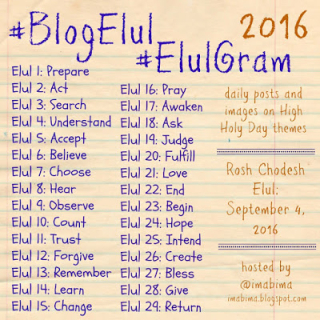 I turn again toward you.
I turn again toward you.
My eyes are clear and open.
I keep you always before me.
Your presence makes me glad.
My eyes are clear, and open
to the future I can't yet see.
Your presence makes me glad
I leap into the unknown.
To the future I can't yet see:
thank you for waiting for me.
I leap into the unknown.
I trust that I won't fall.
Thank you for waiting for me.
With you, I'm never alone.
I trust that I won't fall.
I keep hope in you.
With you, I'm never alone.
Sing to me and I am strong.
I keep hope in you.
I open my heart wide.
Sing to me and I am strong.
I keep you always before me.
I open my heart wide.
I turn again toward you.
Yes, it's another pantoum. (Maybe I need a pantoum category on my blog, to go along with the sestina category.)
Writing these Elul poems has been a gift for me, and has helped me stay connected with my own spiritual life even at this season when my professional life ramps up. I hope that reading them has been sweet for you.
L'shanah tovah -- wishing you a sweet new year.
I'm participating again this year in #blogElul, an internet-wide carnival of themed posts aimed at waking the heart and soul before the Days of Awe. (Organized by Ima Bima.) Read #blogElul posts via the Elul tag; you might also enjoy my collection of Elul poems which arose out of #blogElul a few years ago, now available in print and e-book form as See Me: Elul poems.

October 1, 2016
For #blogElul 28: Give
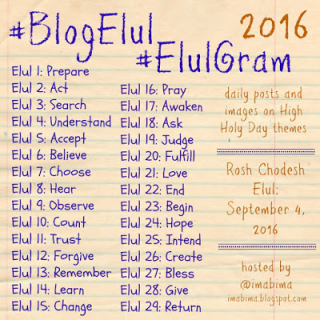 My poems are a dime
My poems are a dime
a dozen. I write so many
they must blur together
even in your memory.
I used to think
I should keep silent,
try to take up less room
-- but I'm pretty sure
you don't want me
to shut off the spigot,
keep my words from flowing.
You know what the poems
really are: distillations
of my love for you
offered with every beat
of my aching heart.
I'm participating again this year in #blogElul, an internet-wide carnival of themed posts aimed at waking the heart and soul before the Days of Awe. (Organized by Ima Bima.) Read #blogElul posts via the Elul tag; you might also enjoy my collection of Elul poems which arose out of #blogElul a few years ago, now available in print and e-book form as See Me: Elul poems.

September 30, 2016
#blogElul 27: Bless
Your voice cascades
chains of blessing
washing over me
like mikvah waters
awakening each nerve
with sheer delight.
I press fingers
to my wrist:
there's your name
pulsing in me
with each beat
of my heart.
What it means
to bless you.
My dear one,
open my lips:
I want to
sing your praise.
Chains of blessing. See the trope marking shalshelet.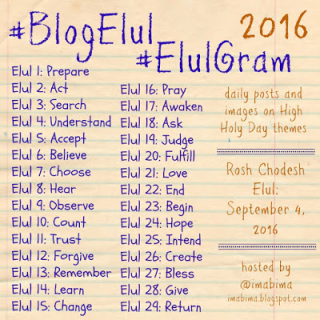
To my wrist. One mode of wrapping tefillin maps each of the seven wraps on the forearm to one of the seven "lower" sefirot. The wrap that goes right over the pulse point is the one that maps to malchut or Shekhinah.
Open my lips. From the verse which precedes the Amidah, "Eternal God, open my lips that I may proclaim Your glory." (Also the title of my latest poetry collection from Ben Yehuda Press.)
I'm participating again this year in #blogElul, an internet-wide carnival of themed posts aimed at waking the heart and soul before the Days of Awe. (Organized by Ima Bima.) Read #blogElul posts via the Elul tag; you might also enjoy my collection of Elul poems which arose out of #blogElul a few years ago, now available in print and e-book form as See Me: Elul poems.

September 29, 2016
#blogElul 26: Create
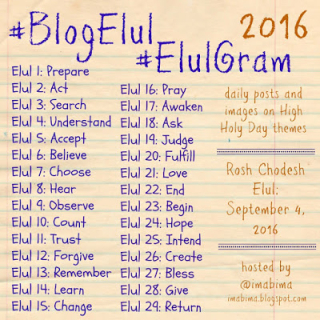 In this new chapter
In this new chapter
I seek out bright colors.
I make the bed every morning.
I don't scoff at slow cookers.
I like gentler, less tannic wines.
I wear contact lenses now.
From these thin threads
the fabric of a life will emerge.
Will the patterns be bold
and beautiful? Will the weave
hold up to hard use
or will it come apart in my hands?
I never learned how to manage
my own loom, not by myself.
Remind me even in my knots
and mistakes there is beauty.
I'm participating again this year in #blogElul, an internet-wide carnival of themed posts aimed at waking the heart and soul before the Days of Awe. (Organized by Ima Bima.) Read #blogElul posts via the Elul tag; you might also enjoy my collection of Elul poems which arose out of #blogElul a few years ago, now available in print and e-book form as See Me: Elul poems.

September 28, 2016
#blogElul 25: Intend
To be aware in every moment
of your hand on my shoulderblade
and the earth beneath my feet.
To notice the gleam of grass
in late morning sun, highlighting
the single reddened maple leaf.
To be patient with myself
when grief wells up. To wrap myself
in kindness like a woolen tallit.
To close the book on the old year.
I never have to push my way through
those narrow straits again.
I'm participating again this year in #blogElul, an internet-wide carnival of themed posts aimed at waking the heart and soul before the Days of Awe. (Organized by Ima Bima.) Read #blogElul posts via the Elul tag; you might also enjoy my collection of Elul poems which arose out of #blogElul a few years ago, now available in print and e-book form as See Me: Elul poems.

September 27, 2016
#blogElul 24: Hope
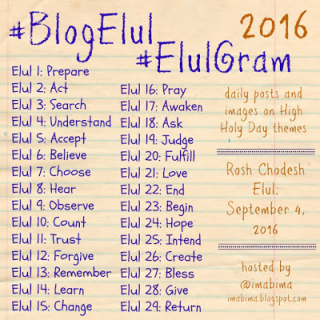 I take hope in your presence
I take hope in your presence
like an arm around my shoulders,
in your music that carries me
as air currents carry seagulls.
Hope says sweetness is coming.
Trust that better days will arrive.
Every day begins in sundown
and opens into brightness,
going from darkness to dawn.
To hope I open my heart wide.
I immerse in hope like living waters.
All I want is to immerse in you.
Every day begins in sundown... A Jewish day begins at sundown, which means that the natural trajectory of Jewish time is from darkness toward light.
I immerse in hope like living waters...immerse in you. The prophet Jeremiah, who lived in the seventh century BCE, wrote, מקוה ישראל ה׳ -- "God is the mikvah of Israel." (Jeremiah 17:13) Another way to translate that quote from Jeremiah is "God is the hope of Israel." מקוה relates to תקווה. When we immerse in God, we also immerse in hope.
I'm participating again this year in #blogElul, an internet-wide carnival of themed posts aimed at waking the heart and soul before the Days of Awe. (Organized by Ima Bima.) Read #blogElul posts via the Elul tag; you might also enjoy my collection of Elul poems which arose out of #blogElul a few years ago, now available in print and e-book form as See Me: Elul poems.

September 26, 2016
#blogElul 23: Begin
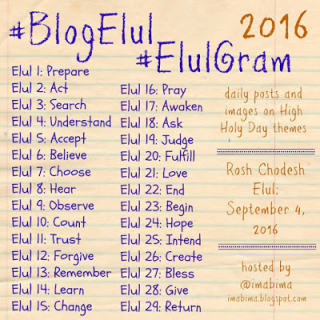 With every ending, something new begins.
With every ending, something new begins.
The end of one chapter starts the next
until the tale itself comes to a close.
We write the book of life with our own hands.
The end of one chapter starts the next
unfolding. Every day that we're alive
we write the book of life with our own hands.
I want your name on every page of mine:
unfolding every day that I'm alive.
Your name reminds me who I want to be --
I want your name. On every page of mine
let me write kindness and compassion.
Your name reminds me who I want to be.
My name reminds me I am God's, I'm strong.
Let me write kindness and compassion
in the book that reads from itself.
My name reminds me I am God's, I'm strong.
The days grow shorter: that's okay.
In the book that reads from itself
I can write my way to happiness.
The days grow shorter: that's okay.
Until the tale itself comes to a close
I can write my way to happiness
with every ending. Something new begins.
We write the book of life with our own hands... in the book that reads from itself. See Everyday I write the book.
My name reminds me I am God's, I am strong. My middle name in Hebrew is Gavriela, "God's Strength."
I seem to be on something of a pantoum kick lately. The new year's poem I co-wrote for ALEPH with Rabbi David is a pantoum, and so is the poem I wrote for #blogElul day 8. There's something about how the form loops back in on itself that feels especially appropriate for this season of reflection and teshuvah.
I'm participating again this year in #blogElul, an internet-wide carnival of themed posts aimed at waking the heart and soul before the Days of Awe. (Organized by Ima Bima.) Read #blogElul posts via the Elul tag; you might also enjoy my collection of Elul poems which arose out of #blogElul a few years ago, now available in print and e-book form as See Me: Elul poems.

September 25, 2016
#blogElul 22: End
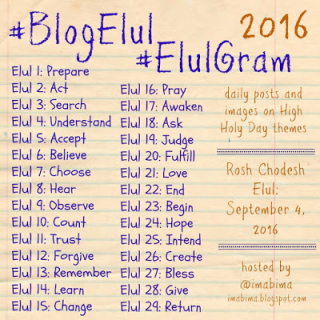 Ending a chapter is hard, especially
Ending a chapter is hard, especially
not knowing what the next will hold.
I write the book of my life with my deeds,
it reads from itself and my signature
is there plain as day, but I don't get
to read ahead. The Jewish year is ending.
There's plenty I don't mind relegating
to memory: every painful conversation,
what we came to call emotional root canal.
Hours sitting tense on the tiny couch
in the couples counselor's office -- not
his fault, but none of that is time
I'd choose to re-live. Let it be over.
A lot of the stories I used to tell
about who I was, who I thought I'd be --
those are over too, and their replacements
not yet known. Can I open my hands, let go
of every ending without losing my grasp
on the things that have no limit?
Love, given and received. Hope
for what might be coming. My gratitude
for you, vast as the Milky Way splashed
across heavens that seem to have no end.
I'm participating again this year in #blogElul, an internet-wide carnival of themed posts aimed at waking the heart and soul before the Days of Awe. (Organized by Ima Bima.) Read #blogElul posts via the Elul tag; you might also enjoy my collection of Elul poems which arose out of #blogElul a few years ago, now available in print and e-book form as See Me: Elul poems.

September 24, 2016
#blogElul 21: Love
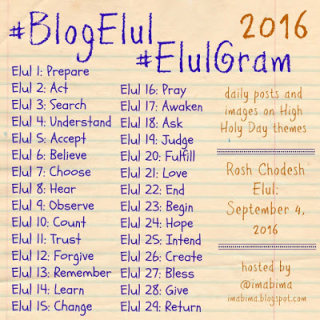 Everything I write is a love letter to you.
Everything I write is a love letter to you.
Some days I'm afraid you don't read them:
that insidious voice whispers in my ear
that even you couldn't possibly want
my graphomanic tendencies. That in writing
day after day I make unreasonable demands.
That my unruly heart takes up too much space.
I can't excise that voice, but I can turn
from the poison it spreads. I remind myself
that you love me not despite who I am
but because of who I am, and that means
all of me. You see my whole heart, even
the parts I try to hide. You don't want me
to pretend. You receive me as I am.
I'm participating again this year in #blogElul, an internet-wide carnival of themed posts aimed at waking the heart and soul before the Days of Awe. (Organized by Ima Bima.) Read #blogElul posts via the Elul tag; you might also enjoy my collection of Elul poems which arose out of #blogElul a few years ago, now available in print and e-book form as See Me: Elul poems.

Rachel Barenblat's Blog
- Rachel Barenblat's profile
- 6 followers


